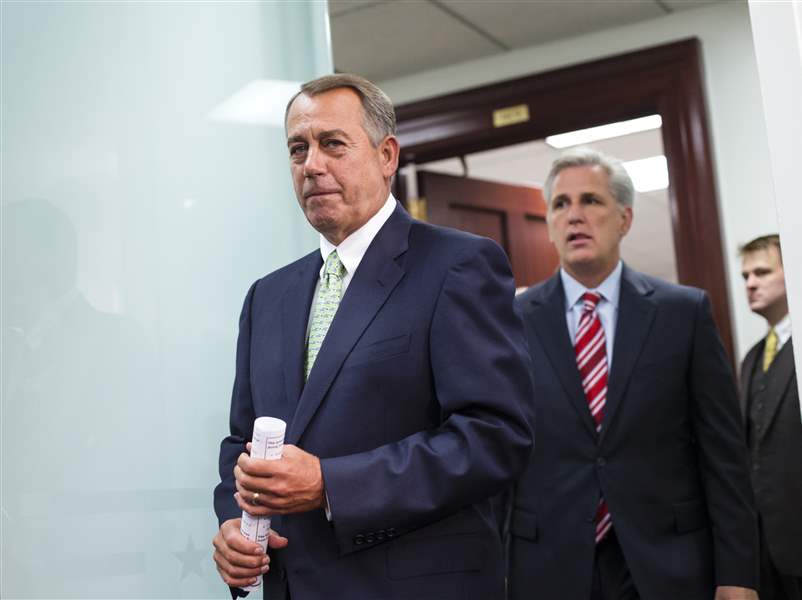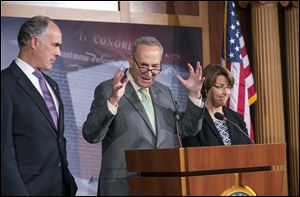
House to vote on stopgap funding bill that seeks to derail president's health care law
9/19/2013
Speaker of the House John Boehner, R-Ohio, and House Republican leaders emerge from a closed-door strategy session at the Capitol, Wednesday, Sept. 18, 2013. House GOP leaders are looking to reverse course and agree to tea party demands to try to use a vote this week on a must-pass temporary government funding bill to block implementation of President Barack Obama's health care law. Boehner is followed by House Majority Whip Kevin McCarthy, R-Calif. (AP Photo/J. Scott Applewhite)
ASSOCIATED PRESS

Sen. Chuck Schumer, D-N.Y., chairman of the Rules Committee, center, flanked by Sen. Robert Casey, D-Pa., left, chairman of the Subcommittee on Fiscal Responsibility and Economic Growth, and Sen. Amy Klobuchar, D-Minn., right, Senate chair of The Joint Economic Committee, speaks to reporters about the economic consequences of a debt ceiling default, during a news conference at the Capitol, Wednesday, Sept. 18, 2013. House GOP leaders Wednesday announced that they will move quickly to raise the government's borrowing cap by attaching a wish list of GOP priorities like blocking Obamacare, forcing construction of the Keystone XL pipeline and setting the stage for reforming the loophole-cluttered tax code. (AP Photo/J. Scott Applewhite)
WASHINGTON — The White House promised a veto of a Republican effort to gut President Barack Obama’s health care law that is part of a temporary funding bill in the House to prevent a partial government shutdown on Oct. 1.
The official policy statement issued today said the GOP attempt to block “Obamacare” ‘’advances a narrow ideological agenda that threatens our economy and the interests of the middle class” and would deny “millions of hard-working, middle-class families the security of affordable health coverage.”
The veto threat was expected and wasn’t going to stop House Republicans from pressing their effort to defund the health care law.
While raising the possibility of a government closure, the latest GOP plan is actually aimed at avoiding one. GOP leaders are looking to shift the fight over health care to even more important legislation required to prevent the government from defaulting on its financial obligations.
Even top advocates of the strategy to defund Obama’s health care law by attaching it to a stopgap government funding bill acknowledge it has no future in the Democratic-controlled Senate. Senate Democrats have the votes to strip away the health care provision and send the stopgap measure right back to the House.
Republicans in the House spent Wednesday talking about how hard they would fight to derail the health care law on the eve of its implementation and weren’t conceding that their Senate rivals would undo their handiwork. A key force in the tea party drive against the law conceded the point even before the fight officially began, but urged the House to force a government shutdown rather than retreat.
“Harry Reid will no doubt try to strip the defund language from the continuing resolution, and right now he likely has the votes to do so,” said Sen. Ted Cruz, R-Texas. “At that point, House Republicans must stand firm, hold their ground and continue to listen to the American people.”
House Republicans when Cruz conceded that Senate Democrats have the votes to beat him. Cruz was only reflecting reality, but House Republicans accused him of surrendering before the fight even began.
Cruz is advocating a shutdown rather than allow the health care law to move forward. He told The Associated Press today that the 1995-96 government shutdown was just a “partial, temporary government shutdown” that didn’t hurt Republicans politically as much as most people think and that it helped spark welfare reform in 1996 and a budget deal in 1997.
“Nobody likes that outcome. But it also wasn’t the end of the world,” Cruz said.
Cruz’ reading of history is open to question; it’s true that during the partial shutdown, essential government services continued, but the confrontation had little connection to welfare reform or the budget deal that came more than a year later.
House leaders are likely to hold a vote on Friday.
A likely outcome would be that the House would vote to pass a funding bill stripped of the health care provision and send it to Obama to avert a shutdown. Top GOP leaders in the House and Senate made it clear they have no appetite for a shutdown showdown.
“I don’t think that any reasonable person thinks there’s anything to be gained by a government shutdown,” Republican Sen. John Cornyn, another Texan, said. “Rather than a shutdown of government, what we need is a Republican victory in 2014 so we can be in control. I’m not sure those are mutually compatible.”

Speaker of the House John Boehner, R-Ohio, and House Republican leaders emerge from a closed-door strategy session at the Capitol, Wednesday, Sept. 18, 2013. House GOP leaders are looking to reverse course and agree to tea party demands to try to use a vote this week on a must-pass temporary government funding bill to block implementation of President Barack Obama's health care law. Boehner is followed by House Majority Whip Kevin McCarthy, R-Calif. (AP Photo/J. Scott Applewhite)
GOP leaders have telegraphed they would likely concede to the Senate’s demand for a stopgap spending bill shorn of the Obamacare provision but that they would carry on the fight over legislation to increase the government’s borrowing cap.
“There should be no conversation about shutting the government down,” House Speaker John Boehner, R-Ohio, said. “That’s not the goal here.”
The debt-limit measure, required to allow the government to pay all of its bills on time, would be brought to the House floor as early as next week and would allow the Treasury to borrow freely for one year.
Republicans vow to load that bill with a GOP wish list, including another assault on the health care bill and a provision to force the construction of the Keystone XL pipeline from Canada to Texas Gulf Coast refineries, a project that environmentalists oppose and that the Obama administration so far has refused to approve.
Democrats strongly denounced the Republican move. Sen. Chuck Schumer of New York said the GOP was pursuing an “insane plan.” Sen. Amy Klobuchar of Minnesota said, “A group of extremists is threatening to hold our government hostage.”
Obama, speaking Wednesday to business executives at a meeting of the Business Roundtable, said, “You have never seen in the history of the United States the debt ceiling or the threat of not raising the debt ceiling being used to extort a president or a governing party and trying to force issues that have nothing to do with the budget and have nothing to do with the debt.”
Separately, the Obama administration’s budget director, Sylvia Burwell, issued a memo to department heads that said, “Prudent management requires that agencies be prepared for the possibility of a lapse” in funding.